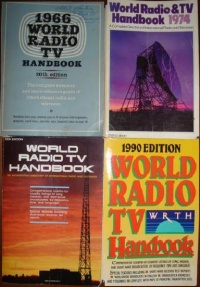Difference between revisions of "WRTH"
Jon Preddle (talk | contribs) |
John Lavalie (talk | contribs) |
||
| (2 intermediate revisions by one other user not shown) | |||
| Line 1: | Line 1: | ||
| − | ==WORLD RADIO TV HANDBOOK (WRTH)== | + | =='''WORLD RADIO TV HANDBOOK (WRTH)'''== |
''The Directory of International Radio & Television'' | ''The Directory of International Radio & Television'' | ||
| Line 20: | Line 20: | ||
* The BBC's main markets were [[Australia]] and [[New Zealand]] and the [[United States]] | * The BBC's main markets were [[Australia]] and [[New Zealand]] and the [[United States]] | ||
* BBC programmes became popular in the [[United States]] from 1971, when PBS and other non-commercial stations began looking elsewhere for quality programming, and turned to the BBC because of its reputation | * BBC programmes became popular in the [[United States]] from 1971, when PBS and other non-commercial stations began looking elsewhere for quality programming, and turned to the BBC because of its reputation | ||
| − | * The BBC has an exclusive deal with [[wikipedia:Time-Life|Time Life]] to act as distributor in the US | + | * The BBC has an exclusive deal with [[wikipedia:Time-Life|Time-Life]] to act as distributor in the US |
* The BBC sells to over 100 countries | * The BBC sells to over 100 countries | ||
* Much of the revenue taken from foreign sales goes to the authors and actors and artists, with "modest amounts" going to the BBC | * Much of the revenue taken from foreign sales goes to the authors and actors and artists, with "modest amounts" going to the BBC | ||
Latest revision as of 01:22, 28 October 2019
WORLD RADIO TV HANDBOOK (WRTH)
The Directory of International Radio & Television
An invaluable resource tool is the World Radio TV Handbook (WRTH), which has been published annually since 1947. The Handbooks contain details on all the radio and television stations around the world. Much of the population, TV systems, channel names and identity detail used in BroaDWcast has been sourced from these guides.
The WRTHs also contain articles and features of interest; for instance the 1974 edition contains a transcription of an address made on 12 April 1973 by the BBC's Managing Director, Huw Wheldon, in which he extols the virtues of the BBC selling more and more material around the world, the benefits of dubbing (he mentions having seen "Dr Who... in Arabic, and a curious experience it was") and the profits made from worldwide sales.
Other points of note in the 1974 volume:
- In 1962, a few scores of programmes were sold around the world
- By 1972, 1,400 films and tapes were sent out from London every month
- At the same time a further 600 films and tapes were circulating between one country and another
- Turnover of programme sales in 1962 was just under £300,000; turnover in 1972 was just over £3 million – an increase by tenfold in as many years
- Dubbing is becoming more common
- More sales have been made to Iran than ever before
- The BBC's main markets were Australia and New Zealand and the United States
- BBC programmes became popular in the United States from 1971, when PBS and other non-commercial stations began looking elsewhere for quality programming, and turned to the BBC because of its reputation
- The BBC has an exclusive deal with Time-Life to act as distributor in the US
- The BBC sells to over 100 countries
- Much of the revenue taken from foreign sales goes to the authors and actors and artists, with "modest amounts" going to the BBC
- The cost to buy a series can be £600 for one country, but a much as £60,000 for another, even before any profit is made
.
WRTH Sites
